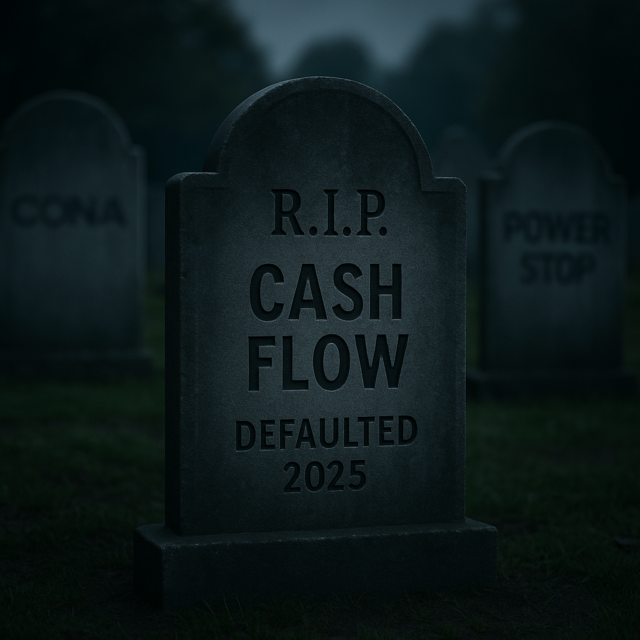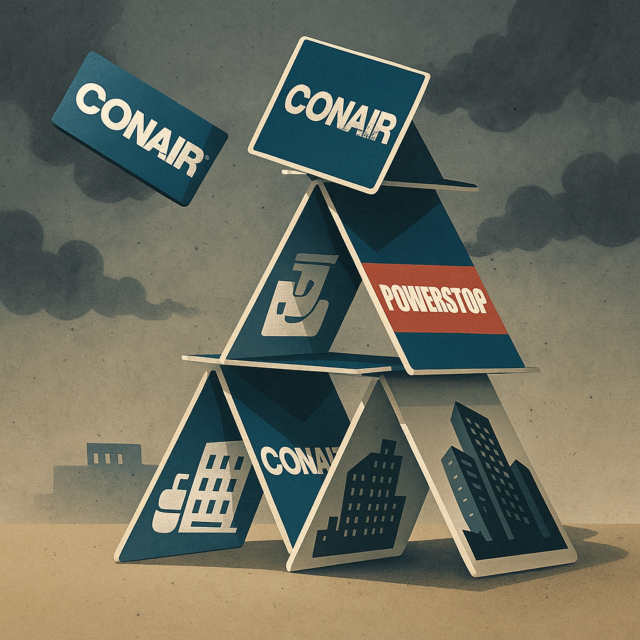The Corporate Default Wave Is Here, And It’s a Warning to Real Estate Investors
Moody’s just dropped a bombshell: 241 companies are now on their highest-risk default list, the most we’ve seen in almost a year. And no, this isn’t just about overextended tech startups. We’re talking about recognizable names in consumer goods, manufacturing, and even private equity–backed companies. Brands like Conair and PowerStop, real businesses with real employees are starting to buckle under pressure.
What’s taking them down? The same thing that’s taking down real estate deals right now: cash flow pressure.
When Cash Flow Dies, Everything Else Goes With It
These companies are being downgraded for the same reason you might be stressing about your own balance sheet. Too much debt. Slowing income. Rising costs. It’s not just a mom-and-pop problem anymore this pressure is now hitting the big dogs.
We’ve seen this movie before. In 2008, it was condo flippers and over-leveraged mortgage firms. Today, it’s brake kits and beauty products. Different actors. Same plot.

What Caused the Surge in Defaults?
Three culprits are squeezing both corporations and real estate investors alike:
-
High interest rates: Debt is more expensive than ever.
-
Tariffs and inflation: Input costs are up across the board.
-
Weakened consumer demand: Buyers are pulling back.
When revenues drop and debt payments rise, defaults follow. It’s already happening in real estate, and now it’s happening everywhere else.
A Story From the Last Cycle
Let me take you back to 2009. I got a call from a lender about a half-renovated 300+ unit apartment complex in Arlington, TX. The owners had run out of cash mid-renovation. Why? Because they had to vacate units to renovate, which meant zero cash flow. When financing froze, they walked away, and the lender was left holding the bag.
I bought that property for pennies on the dollar. Not based on potential. Based on today’s numbers, what it could cash flow, what it would cost to complete, and what it was worth now. That deal became one of our top performers just three years later.
Not All Distressed Deals Are Winners
Ross and I were once offered a 250-unit deal in Texas, 50% vacant, owned by a bank. They were practically giving it to us and even offering funds to rehab it. But once we crunched the numbers, the math didn’t make sense. Too much cost, not enough upside. So we passed.
Remember: just because it’s distressed doesn’t mean it’s a deal.
Why Real Estate Investors Should Care About Corporate Defaults
You might be thinking, “Ken, I’m not in consumer products. Why does this matter?” Because it’s the same exact pattern.
These companies borrowed heavily when rates were low. They didn’t plan for volatility. Sound familiar? It’s exactly what’s happening in real estate syndications right now.
I’ve seen deals with:
-
Short-term, floating-rate debt
-
No reserves
-
No interest rate caps
-
No plan for what happens when the tide goes out
And guess what? The tide has gone out, and a lot of people just found out they were swimming naked.

What Investors Must Ask Right Now
This corporate default wave is your wake-up call. Start asking yourself:
-
Does my deal cash flow today—not on pro forma?
-
Can it survive another 12-24 months of tight credit?
-
What happens if my expenses rise 5–10%?
-
What if my lender won’t renew the loan?
These aren’t hypotheticals anymore. They’re the reality many investors are living.
Where Opportunity Lives in a Default Cycle
The good news? This is exactly when some of my best investments happened.
Back in 2010, we bought a 580-unit deal in San Antonio from a lender. It was over 50% vacant. The prior owners had defaulted. The place was a mess. We fixed the management, rehabbed the property, stabilized it, refinanced and returned all our investor equity. Now we own it with zero dollars in and massive ongoing cash flow.
I’ve also made serious money cleaning up failed condo conversions, projects that started strong but ran out of steam. Those are starting to pop up again today.
The Formula for Buying in a Crisis
Here’s how I approach these kinds of deals:
-
Get Liquid. Cash is king in a down cycle.
-
Underwrite Tight. No cash flow, no deal.
-
Target Property-Level Distress. Not market-wide panic.
-
Control Your Debt. Fixed-rate, long-term. No exceptions.
When I evaluate someone else’s deal, I ask:
-
What if rents drop 5–10%?
-
Are they relying on a refinance to survive?
-
What’s the real cash flow not what’s in the pitch deck?
For more on what myself and my company, MC Companies, looks for in a deal, be sure to check out this webinar from our investor relations team.
Final Thought: The Default Wave Is Just Beginning
Whether it’s a corporate balance sheet or your next real estate acquisition, cash flow is the oxygen. Without it, everything collapses.
We’re entering a cycle where the overleveraged will get flushed out and the disciplined investors will thrive. I’ve been through this before. I’ve made mistakes. I’ve learned. And today, I’m stacking dry powder, underwriting tight, and waiting for the right opportunity.



